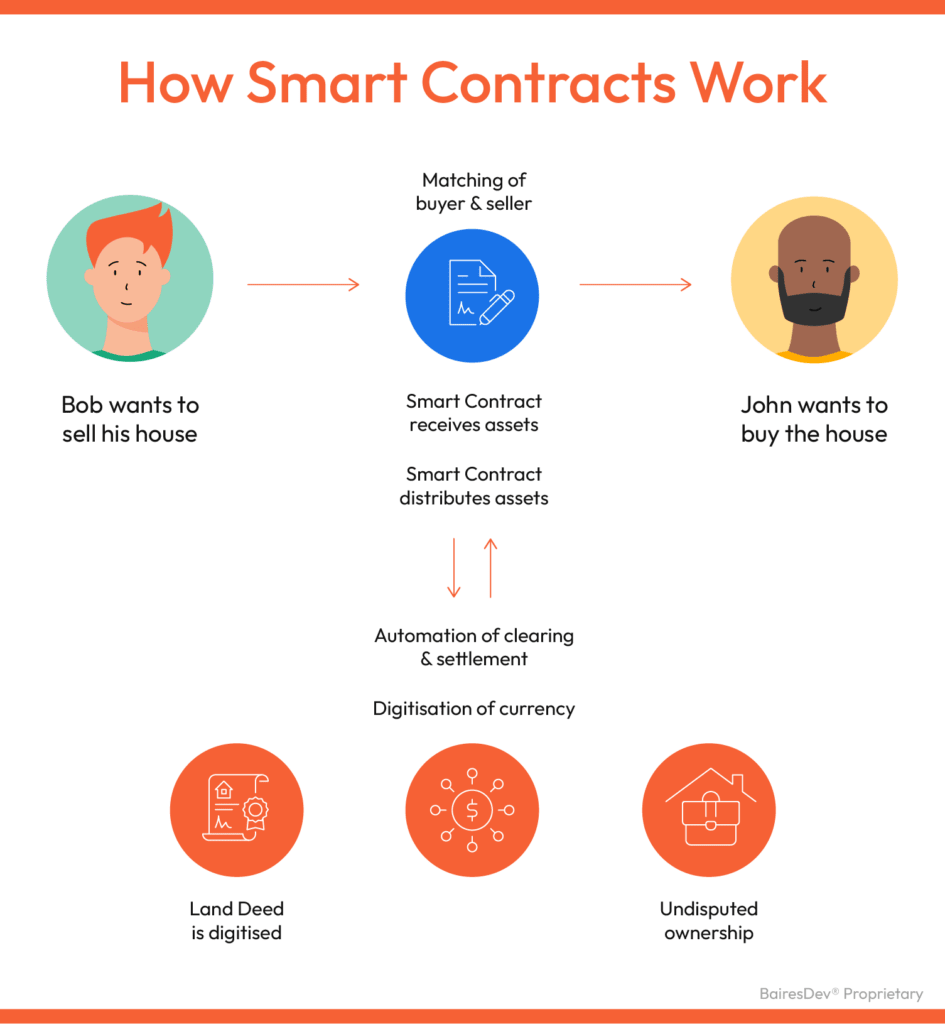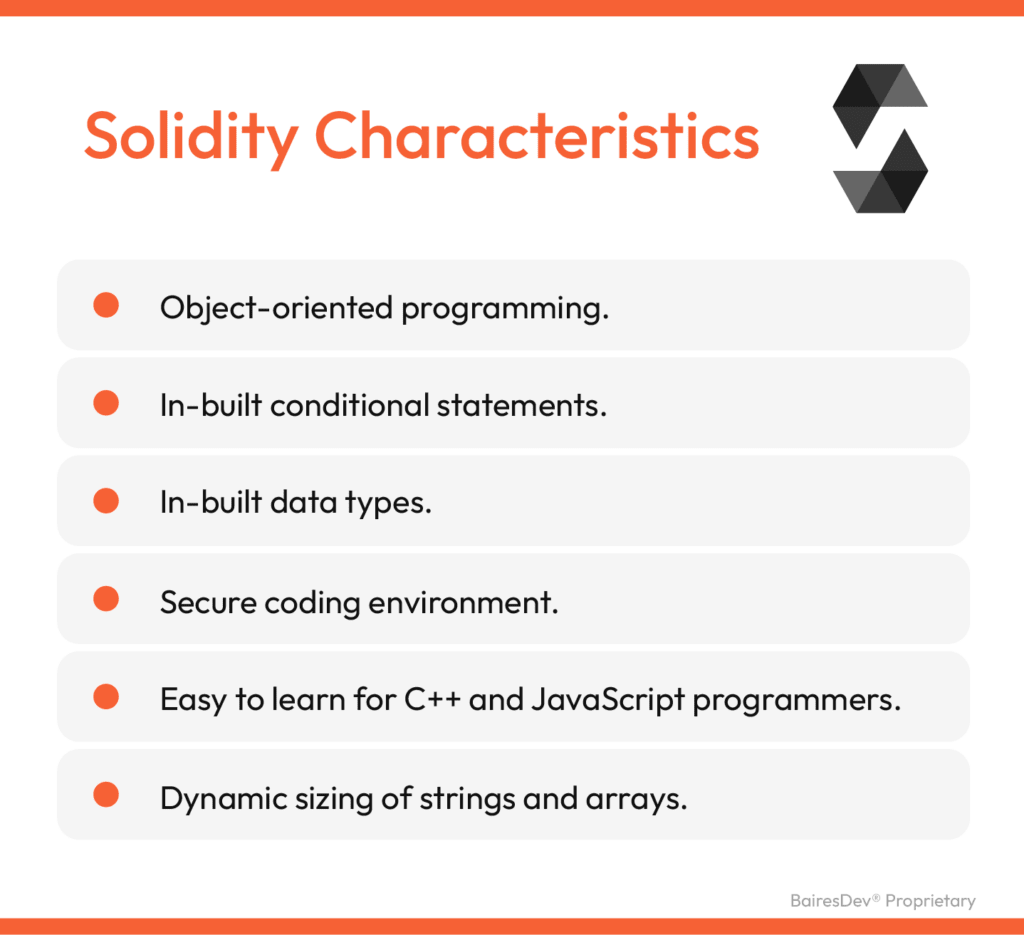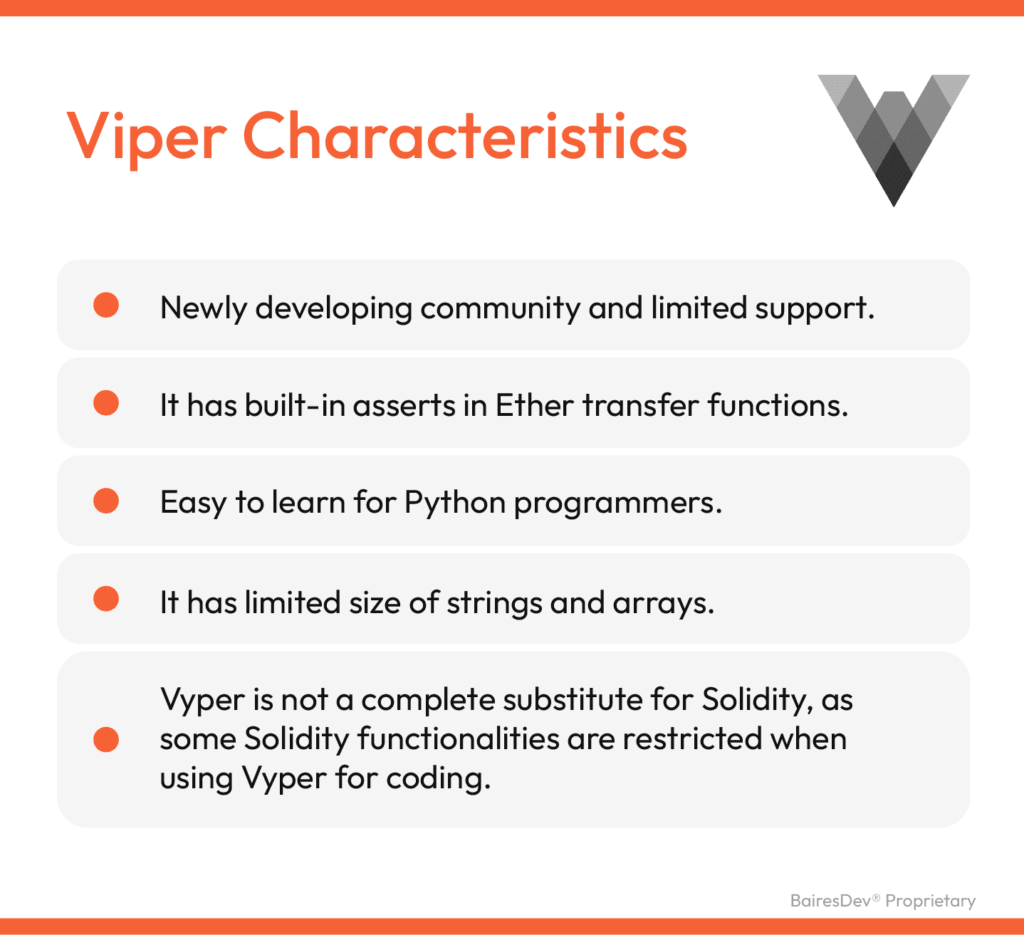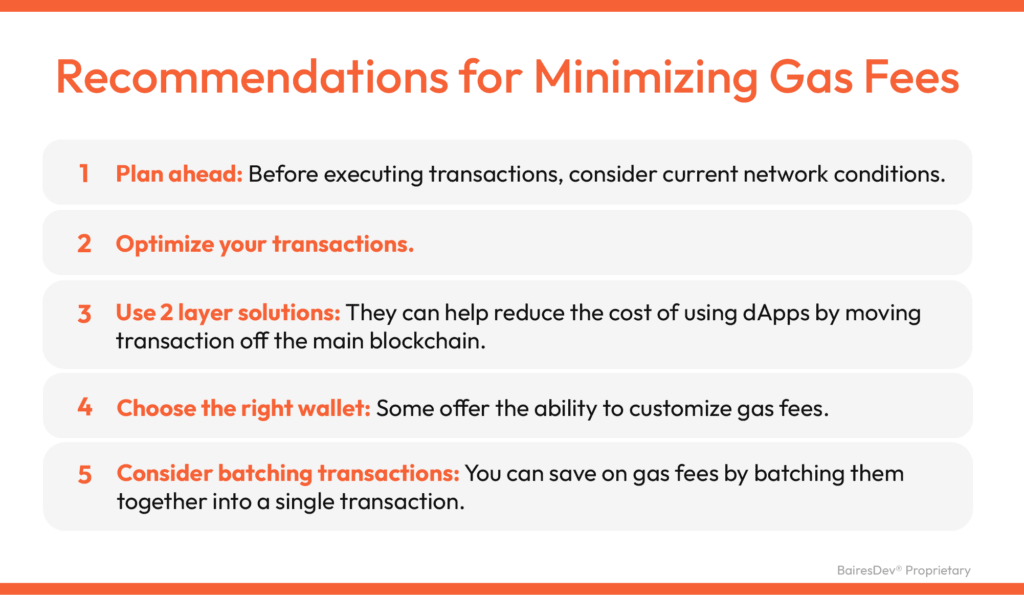Before we dive headfirst into the ocean of smart contract programming languages, let’s take a moment to understand what exactly these elusive “smart contracts” are. In essence, smart contracts are self-executing contracts with the terms of the agreement directly written into lines of code. The code and agreements contained therein exist across a distributed, decentralized blockchain network (think of this as an incorruptible digital ledger).
Now, here’s where it gets interesting. Smart contracts permit trusted transactions and agreements to be carried out among disparate, anonymous parties without the need for a central authority, legal system, or external enforcement mechanism. In other words, they’re like your favorite superhero—working independently and ensuring justice without any interference.
To put it in more technical terms, smart contracts render transactions traceable, transparent, and irreversible.
Let’s consider an example to better illustrate this concept. Suppose we’re dealing with property rental in a city. Normally you’d go through a broker (who would charge fees), pay in cash or transfer funds via banks (which could take time), and trust them to not run away with your money before handing over the keys.

With smart contracts though, you simply drop your crypto coins into a ledger (the smart contract). Once the payment is confirmed by both parties involved (you and the landlord), you’ll receive a receipt that is held in a virtual contract. Then you’ll get a digital entry key at the date of lease commencement! No middlemen, no extra fees—just pure transactional bliss.
So now that we’ve dipped our toes into understanding what smart contracts are all about, let’s plunge into the pool of programming languages that make these contracts possible.
The Emergence of New Smart Contract Programming Languages
Now, you might be wondering why there’s a need for new programming languages when we already have established ones like Python and Java. Well, traditional programming languages aren’t always the best tools for creating secure and efficient smart contracts.
Newer languages such as Solidity and Vyper have been developed specifically for writing smart contracts on Ethereum, one of the most popular blockchain platforms. These languages are designed with security in mind, minimizing potential vulnerabilities while maximizing efficiency and clarity.
Ethereum’s Solidity: An Introduction
Solidity was designed with the express purpose of enabling developers to write applications that implement self-enforcing business logic (also known as smart contracts). These are encapsulated in cryptographic code and run on the Ethereum blockchain. It’s a bit like building a robot lawyer who works tirelessly 24/7, ensuring all terms and conditions are met without any human intervention.
To illustrate its functionality, let’s consider a real-world example. Suppose we’re running an online betting platform for a football championship. With traditional systems, we’d need to manually verify each bet, monitor match results, and distribute winnings—a process prone to human error and delays.
But with Solidity, we can create a smart contract that automates this entire process. The contract would accept bets up until kickoff time (preventing any late-game wagers), automatically check live scores from trusted data sources (no more disputes about final scores), and distribute winnings immediately after the game ends (no waiting around for your hard-earned cash).
In essence, Solidity enables us to replace cumbersome manual processes with efficient automated systems that operate transparently and reliably. It’s not just about doing things faster; it’s about doing them better.
So while Python or Java might be your comfort zone, stepping into the world of Solidity opens up an entirely new dimension of digital possibilities.

Diving Into Vyper: The Python-Based Language for Ethereum
Moving on from Solidity, we find ourselves dipping our toes into the world of Vyper, a relatively new kid on the Ethereum block. This Python-derived language is like a breath of fresh air for those who prefer their code clean, simple, and easy to understand (a bit like that tidy desk you always promise yourself).
Unlike Solidity, which can be somewhat lenient with its rules, Vyper takes a more disciplined approach. It has been designed with security in mind and intentionally lacks certain features to prevent potential security breaches.
Now, let’s say we’re running an online auction platform where users bid on rare collectibles. In the traditional setup, bids are manually monitored and verified—a process that’s not only time-consuming but also prone to human error.
With Vyper though, we can create a smart contract that automates this process entirely. The contract would accept bids until the auction end time, verify each bid against the user’s digital wallet balance, and automatically transfer ownership of the item to the highest bidder once the auction ends.
In essence, Vyper enables us to streamline complex processes with transparency and reliability while maintaining robust security measures. So while Solidity might be your first love in smart contract programming languages, taking a dive into Vyper could open up a whole new world of possibilities.

Comparing Ethereum Solutions
In our quest to determine the most suitable smart contract language, we’ll delve into aspects such as tooling and usability. Of particular interest is gas optimization, a key concern for any smart contract developer. We’ve narrowed down our focus to 3 EVM languages (Ethereum virtual machine languages that function on chains like Ethereum, Avalanche, Polygon, etc.): Solidity, Vyper, and Yul.
Before we get started, here’s a spoiler alert: All 3 of these languages are pretty great at what they do. Solidity and Vyper shine as high-level languages that most people should use. If you’re keen on writing near-assembly code, Yul is your go-to option.
Let’s not forget that these languages evolve constantly, and choosing one over another based on cherry-picked data or specific contracts can be misleading. For this reason, when we compare gas optimization later in this article, remember that we’ve chosen a minimal contract for comparison purposes.
Now, for those of us who have been around the block(chain) a few times, let’s take an in-depth look at these languages.
The 3 EVM-compatible languages under our microscope are:
- Solidity: the current favorite by DeFi TVL (total value locked), high-level, similar to JavaScript
- Vyper: second in popularity by DeFi TVL, high-level, similar to Python
- Yul: another low-level language resembling Assembly that comes built in with Solidity (though some might argue it’s still too high-level)
Why these 3? Well, Solidity and Vyper are the top 2 most popular languages by a significant margin. We included Yul because it wouldn’t be fair to compare gas optimization without considering it.
When we look at the current landscape of DeFi space, according to DefiLlama, Solidity smart contracts secure 87% of TVL, while Vyper smart contracts secure 8%. So if popularity is your main criterion, you can stop right here—Solidity takes the cake.
However, let’s not judge a programming language by its popularity. To make an informed decision, we need to see what each language looks like and compare their gas performance.
In terms of developer experience, it’s quicker to write code in Solidity and Vyper—which makes sense given they’re higher-level languages. On the other hand, Yul is designed for low-level coding. It’s clear why many developers gravitate toward Vyper and Solidity—not only are they easier to use but they’ve also been around longer.
Looking at gas optimization now, there are 2 key factors:
- Contract creation gas costs
- Runtime gas costs
How you implement your smart contract can significantly impact these costs. For instance, storing a large array in your contract code makes it expensive to deploy but cheaper to run a function with. Conversely, generating the array on the fly makes the contract cheaper to deploy but more expensive to run.

After comparing these 3 languages, we found that Yul is cheaper in terms of gas, as they do exactly what you tell them to do—no more, no less. On the other hand, Vyper and Solidity try to protect you from potential pitfalls.
In conclusion, each of these languages has its strengths and trade-offs. It ultimately comes down to your specific needs and preferences as a developer.
Tezos’s Michelson: A Game Changer for Developers
Leaving the confines of Ethereum, we now set our sights on Tezos and its unique language, Michelson. It’s like trading in your trusty old bicycle (no offense to Vyper or Solidity) for a sleek, high-tech hoverboard.
Michelson is a low-level, stack-based language designed specifically for Tezos smart contracts. This structure provides Michelson with a high degree of precision and security.
In essence, Michelson opens up new avenues for developers by offering precise control over contract execution while maintaining robust security measures. It might be more complex than its counterparts (and require slightly more caffeine), but its potential benefits are worth exploring. So strap on your developer helmets and get ready for an exciting ride with Michelson!
Blockchain data platform cloud migration
BairesDev partnered with a client operating a robust blockchain data platform. This platform offers data, software, services, and research to government agencies across more than 60 countries. They approached us with the objective of migrating their services to a serverless architecture. This move aimed to facilitate scalability while ensuring strict adherence to U.S. laws governing digital information.
BairesDev’s dedicated developers meticulously delved into the intricacies of the blockchain system, focusing on optimizing the infrastructure for efficiency and resilience. One crucial aspect involved the migration of critical information to the cloud. Our involvement encompassed fine-tuning the platform’s infrastructure, leveraging the power of the cloud for data utilization, and guaranteeing compliance and scalability. Our collaboration resulted in a successful migration that not only met but exceeded the client’s aspirations for a robust, efficient, and compliant blockchain data platform.
Final Thoughts: The Impact on Blockchain Technology and Cryptocurrency Markets
The choice of smart contract programming language isn’t just a technical decision—it’s a strategic one with far-reaching implications for blockchain technology and cryptocurrency markets. Each language brings its unique strengths (and weaknesses) to the table, shaping the overall functionality and resilience of DeFi applications.
The evolution of these languages will invariably influence how robust, secure, and user-friendly our blockchain systems become. Imagine Ethereum’s Ether (ETH), for instance. Its value doesn’t just stem from speculative trading but also from its utility within Ethereum’s network where it is used to execute smart contracts written in Solidity. Therefore, improvements in Solidity could potentially enhance Ether’s utility within its ecosystem, which may indirectly impact its market value.
We’re not merely choosing Solidity or Vyper or Michelson—we’re shaping the future contours of blockchain technology and cryptocurrency markets. Here’s to making informed choices for decentralized finance!







